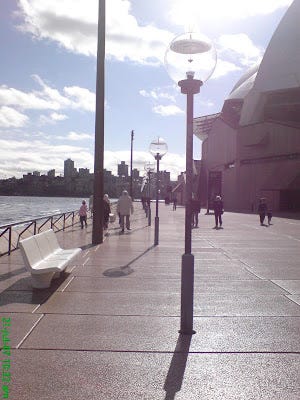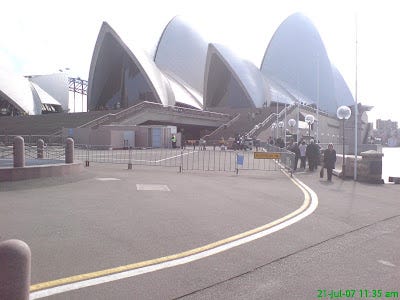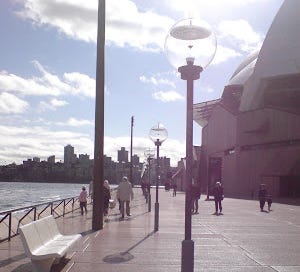*

I turn and look at the board, and there - right across it - I have written a very famous quote.
"Injustice anywhere is a threat to justice everywhere."
I think we killed the man who said that.
What was I telling them today? What was I feeding hand-over-fist into their impressionable minds? The ethics of literature. The responsibility of the author to maintain honesty, integrity, to present the reader with as accurate a representation of the issues as can be managed.
"But according to whose perspective?" one student asked. "Surely truth is relative. Surely truth is perceived very differently from one person to the next."
"Yes," I said. "Truth is relative. Truth is personal, it is individual."
"So where do we draw the line?" the student asked. "Where does one individual's perception of what he considers to be the truth become a lie?"
I laugh. I do my very best Jack Nicholson and say, "Truth? You want the truth? You can't handle the truth..."
The bell goes. Class dismissed. The students looks at me as he leaves and I see suspicion and accusation in his eyes. The question was never answered.
And I think, I was like you. A long time ago I was like you.
R.J. Ellory. A Simple Act of Violence.

Well in all that swirl, in the shadows and constructions, the clouds blooming upwards, there was always the formation of creatures, semblances of intelligence, creatures that possessed the same cognitive faculties as we did. It was strange, he didn't mind admitting that, a strange way to be, these things blooming in the dusk, growing and seething through the night, artificial, imagined forms of life which over time became just as real as any other construct. He wanted to create. He wanted to build a perfect world. Somewhere that was safe, imagined, but none the less intoxicating, where these strange intelligences were kind to each other, knew compassion, their over-large eyes peering at each other with some kind of transcendent understanding.
This was the world he wanted to enter, far away from the dreary breaks that were this city. Everyone complains now. It's toxic, he said, and meant it. The city has gone sour. What is it? she asked, looking like someone he could easily fall in love with. Someone who had entered this strange dream, and charged a fortune to be there. A professional soothsayer. It's because it's so hard to survive. It's because so many shallow, callow arseholes made so much money in the real estate boom, and they have nothing but contempt for those who didn't. Like himself.
My patients from Melbourne complain bitterly about it, she said. They say Sydney is so hostile, people couldn't care less about each other. Yes, it's true, he said, talk to any taxi driver, all anyone wants to do is get out of here. Unless you've reached the pinnacle. Unless you have a sprawling mansion spreading down to the Harbour. Unless you drive a black four wheel drive BMW, just one of the cars parked in the garage, rotating garage floors, heated concrete, maids, flower delivery, fish delivery, dry cleaning delivery. The luxuries of another age. Here where almost everybody makes their own breakfast.
He was crystallised in that moment. I could do with some love in my life, he said, and she laughed wryly. Couldn't we all. He had always thought, young and wanted, queued for, the subject of gossip and suicides, that he couldn't wait to be old and ugly so they would want him for himself. And then suddenly he was too old for anybody, and his rotting body turned himself off as much as anybody else. He was embarrassed to take his shirt off and the flesh sagged. Too many cigarettes, his face said. And he was crippled and crystallised and left lying on the bottom of the aquarium, unadjusted, uncertain, keening for a lost love.
They had all departed with the beauties of the flesh. They had gone their way into their own oblivions, those poolside moments when wealthy queens and young boys spilled out of spare rooms; in the suburbs they had been whisked to, as entertainment, as loot. There was Stuart and Peter and Michael and all of them; boys who would spend the majority of their lives in jail. He was haunted by them to this day. Where did they go? What happened to them? Were they eaten alive?
They were certainly eaten alive on that fateful night, when David stood by the pool in his borrowed swimmers, his lithe body and handsome face the envy of them all, and he jumped in the pool, clumsily, delightfully, a street kid not used to the water, a Westie unaccustomed to the beach. And every drip of water that fell from his body as he pulled himself out of the water was watched with great intensity. The water pooled at his feet and they perved, all of them, in unison, as they watched the drops run down his young flesh. Even then he was shy, didn't want to strip in front of so many watching eyes. So instead he drank. Drank so much he disappeared; and could never even remember leaving that place. All he could remember was that young man by the pool; the bedroom doors opening and shutting inside the house; and their terrible, lecherous, stripping stares, treating the flesh of his friends as cuts of meat, there to be admired, gasped at, eaten alive.

THE BIGGER STORY:
http://www.abc.net.au/news/stories/2009/03/03/2505607.htm
Dawn has brought extreme winds to parts of Victoria as the state braces for conditions similar to those experienced during the Ash Wednesday fires.
However the weather bureau's Peter Blake says the strong winds are now not expected to reach the state's north.
"We've actually cancelled the severe weather warning for the Mallee and northern country, so it's really only southern and mountain areas where we're expecting the gale force winds," he said.
Mr Blake says they are expected to gust up to 100kph.
"The alpine area is showing winds of 60 to 70kph, with higher gusts, and we'll see that continued strengthening of the winds during the morning," he said.
Around 5,000 firefighters are on alert across the state.
Four fires are still burning out of control, with the Kilmore East-Murrindindi blaze causing the most concern.
Department of Sustainability and Environment spokesman Denis Ward says overnight crews have been making good use of the cool and calmer weather.
"The fires have been quiet overnight, in particular down at (Wilsons Promontory), the Bunyip complex, and the Kilmore East-Murrindindi South complex," he said.
"The same with the Kilmore East-Murrindindi North complex, where there's been a fair bit of work being done overnight again as there has been the last two or three nights."
http://www.blogger.com/post-create.g?blogID=2371992372220763819
The Farce of Global Warming
Written by Janet Levy, American Thinker
Monday, 02 March 2009
With the Obama administration calling for curbs on greenhouse gas emissions and the nation in the grip of the most severe economic downturn since 1929, it would seem prudent to re-examine the debate on the causes of global warming before tossing aside entire industries and technologies in favor of untried, and possibly infeasible and unprofitable, "green" technologies.
Wholesale acceptance of human-caused global warming does not, in fact, exist. Indeed, many scientists believe that the highly politicized global warming scare is one of the greatest scams inflicted on the planet. They hold it responsible for enforced political restrictions on legitimate scientific inquiry and dissent and feel that a deliberate attempt has been made to silence prominent atmospheric and climate scientists who offer legitimate criticism.
The Politicization of Global Warming
The politicization of global warming was at play in February 2007, when in response to a report by the United Nations Intergovernmental Panel on Climate Change (IPCC) citing human activity as the primary cause of global warming, syndicated columnist, Ellen Goodman, proclaimed global warming an unequivocal, alarming fact. Ms. Goodman, who holds no scientific credentials, exclaimed that global warming deniers were on par with Holocaust deniers.
A meteorologist with the Weather Channel, Heidi Cullen, subsequently recommended that the Meteorologist Seal of Approval be revoked for any meteorologists skeptical of the human causation of global warming. And although scientists are far from unanimous in their opinions of human responsibility for climate change, Oregon governor, Tel Kulongoski, went so far as to consider firing the state's climatologist for disagreeing with the U.N. conclusions.
Dr. James Hansen, a NASA climate scientist who pioneered the research on global warming and politicized the issue with Al Gore's widely debunked Academy Award-winning movie An Inconvenient Truth, has referred to skeptics as being guilty of "high crimes against humanity and nature." He has called for mass civil disobedience at the coal-fired capital power plant in Washington, D.C.
Voices of Dissent
Yet, much doubt exists over the IPPC climate change theory. Hansen's own supervisor at NASA claims that Hansen has "gone off the deep end" with insufficient evidence and has violated NASA policies by arguing against the agency's official position on climate.
Recently, a group of Japanese scientists from a government advisory panel publicly announced their disagreement with the IPCC report and declared that climate change is driven by natural cycles related to solar activity and has nothing to do with CO2 emissions. The climate modeling used to support claims of man-made global warming was dubbed "ancient astrology" by a program director for the Japan Agency for Marine-Earth Science & Technology.
Skepticism over human-caused global warming was also raised as recently as February 25th at a U.S. Senate Committee on Environment and Public Works hearing hosted by Senators Barbara Boxer and James Inhofe. There, Dr. William Happer, Princeton University professor and former Director of Energy Research at the Department of Energy (1990-1993), presented some of his key findings on climate change. One of just four scientists invited to address the forum, Dr. Happer, who supervised all DOE work on climate change, is a climate crisis skeptic. In his presentation, he noted that 650 prominent international scientists, including both former and current IPCC participants, have challenged the claims made by the 52 scientists who authorized the U.N. panel's report. He also called CO2, a compound singled out by the IPCC as a major contributor to global warming, as, in fact, a beneficial compound essential for life on earth.
http://news.xinhuanet.com/english/2009-03/03/content_10930891.htm
DHAKA, March 2 (Xinhua) -- "Dad...Talk to me, talk to me, Dad, Dad..." uttering the words, a young girl, daughter of a Feb. 25 mutiny victim, was seen sitting near an army flag-draped coffin at a graveyard in Bangladesh's capital Dhaka Monday noon.
Like the innocent girl, hundreds of relatives of the mutiny victims were found bursting into tears as they gathered at a funeral ceremony held on Monday, when the victims, mostly army officers, were buried with state honor.
Thousands of paramilitary Bangladesh Rifles (BDR) members staged a bloody revolt against their commanding officers deputed from the army on Feb. 25 at the BDR headquarters in west of Dhaka, leaving at least 64 army officers dead.
The government decided that all the slain army officers will be buried with state honor after the revolt ended on Feb. 26 evening with surrender of mutineers following negotiations with the government.
A grand funeral ceremony was held in the National Parade Square in Dhaka on Monday for 48 army officers including slain BDR chief Major General Shakil Ahmed, his wife and one army soldier.
The funeral ceremony began with 21 rounds of gunshots salute. After a funeral prayer (Namaz-E-Janaza), Bangladesh Air Force jets also offered flying salute to the victims.
Bangladesh's President Zillur Rahman, on behalf of the Prime Minister Sheikh Hasina her Military Secretary Amin Tarique, Chief of Army Staff General Moeen U Ahmed placed the floral wreaths to the coffins.
"Still I can't believe that he expired. Last week this time we were together," Abdul Hamid, brother of slain army officer M Nakibur Rahman told Xinhua during the ceremony.
A large number of funeral participants, particularly wives and children, of the deceased army officers were wailing loudly at the time when the funeral ceremony began.
However, a more heart-breaking situation was created as soon as the bodies reached the graveyard site and when one after another coffins of army officers were carried to lay down inside the tombs for eternal rest.

Opera House precincts, Sydney, Australia.



